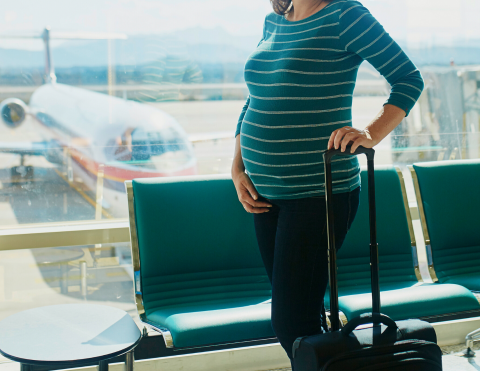Travel Tips While Pregnant
- March 25,2019

Best time to travel:
Doctors recommend that pregnant women should avoid travel during the first 12 weeks of pregnancy. It’s because nausea and tiredness are common in this period and common obstetric emergencies occur during the first and third trimester. The preferred time to travel is between 18 to 24 weeks of pregnancy.
But it’s safer if you consult this decision with your healthcare provider and discuss purpose to travel, destination, underlying medical and pregnancy related complications beforehand.
Air Travel:
Traveling by air isn’t harmful to your baby. However, discussing your health issues or any potential risks particular to your pregnancy with the doctor is necessary. For instance, a pregnant woman with gestational diabetes or multiple pregnancies is not advised to fly by air.
The likelihood of going into labor is higher after 37 weeks, and your airlines may not let you fly towards the end of your pregnancy. So run a check on airlines’ policy regarding this.
Post 28 weeks of pregnancy, your airline can ask you for a letter from your midwife or doctor confirming your due date, and that you aren’t at risk of any complication.
Long distance travel, for more than 5 hours, carries a higher risk of blood clots. To refrain yourself from this during the travel, drink plenty of water and move regularly every 30 minutes or so. In case you have a swelling in your legs, buy a pair of support stockings from the pharmacy to help reduce it.
Vaccinations:
Usually, vaccinations are not recommended because of the concerns that the bacteria or virus in the jab could harm the baby in the womb. However, it is safe to vaccinate pregnant women with influenza vaccine. It is strongly recommended for all pregnant women as influenza can cause a serious illness in pregnancy.
Pregnant women are advised to not travel countries where immunization is an unavoidable process. If it is must for you to travel to countries requiring vaccinations, consult this with your doctor as the chances of having an infectious disease often outweighs the harms of vaccination.
Automobile Travel:
Dizziness and fatigue are two of the common diseases in pregnant women. Hence, when traveling to a long distance destination in a car, drink regularly, eat natural, eat energy-giving foods and keep taking regular breaks.
Keep air circulation at normal in the car and wear the seatbelt with a cross strap between your breasts. Wear lap strap across your pelvis under your bump, not across the bump as a sudden jolt could cause the placenta to separate from the uterus.
Do remember:
The safest time for you to travel is the second trimester, provided you don’t have health risks and complications. Avoid travel to developing countries during pregnancy. And be wary of taking proper medications of any type, including the ones commonly used to treat a traveler’s diarrhea.
